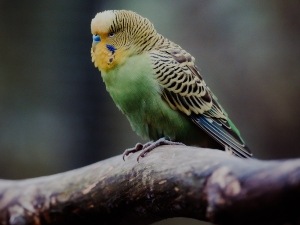
While budgies may be hardy birds they certainly aren’t invincible, they can bleed just as any other animal can.
If your budgie is bleeding from its head you’d be right to worry. This article looks into why your budgie’s head is bleeding.
Table of Contents
Why is my budgie’s head bleeding?
Seeing your budgie’s head bleed can be very scary to any budgie owner.
Head bleeding can turn very dangerous very quickly, so, it’s important to act fast when this happens to your bird.
Here is why your budgie’s head may be bleeding and what to do about it.
If the bird is bleeding internally:
If your bird is bleeding from any of the orifices of its head, if the bird is bleeding from its eyes, mouth, nare, or ears, then this is a medical emergency and means that the bird is bleeding internally.
Bleeding internally usually means that the bird damaged a blood vessel in its head.
If a blood vessel is damaged the blood will rush out of one of the orifices of the bird’s head.
This can happen because of trauma, trauma can happen if the bird is mishandled or if it bumped into something.
What to do:
Your budgie needs to immediately be taken to the vet as this is a medical emergency.
If the bird is bleeding externally:
If your bird suffers an injury to its head, and is bleeding externally, this doesn’t necessarily require medical attention from your vet, but, it may require some attention from you.
External injuries in birds are quite common, the bird may have sustained an injury if it flew into its cage, if it fought with other birds in the cage, or, if it was attacked by a predator or by one of your household pets.
What to do:
If the bleeding is continued, if the bird’s body can’t stop the bleeding on its own, then you may have to intervene.
Isolate the bird somewhere quiet until you can get the bird to the vet.
Doing this will help the bird calm down from any shock that came with the injury.
If your bird is still bleeding it is also advised that you try to stop the bleeding using styptic powder, cornstarch, or even ordinary baking powder.
Apply the powder onto the injury and then apply pressure to the area for about 1-2 minutes.
This powder can be applied to the bird, after you’ve observed the bird for about 5 minutes, and the injury is still bleeding.
Be careful not to get any of the powder into your bird’s nares.
Once the bleeding has stopped you can clean the area with a mild antiseptic solution and use a topical ointment to help with wound healing.
Using a topical ointment that contains antibiotics is recommended.
If the bleeding stops on its own then you can leave the bird alone, the bird will be fine.
It is advised that you still take your bird for an examination at your vet even if you have stopped the bleeding.
If the bird’s injury is severe then the vet may give the bird anti-inflammatory medications, antibiotics, or even surgery if needed.
If you enjoyed this article then you may also be interested in other bird related articles. Here are some articles that you may be interested in: Stress Seizures In Birds, Bird Died After Bath, Budgie Twitching Leg, Canary Twitching Head, Cockatiel leg twitching, Why Does My Cockatiel Love My Feet?, Why Does My Cockatiel Sing To My Feet?, How Do I Know If My Budgies Beak Is Too Long?, What To Do If Budgie Beak Is Too Long?

